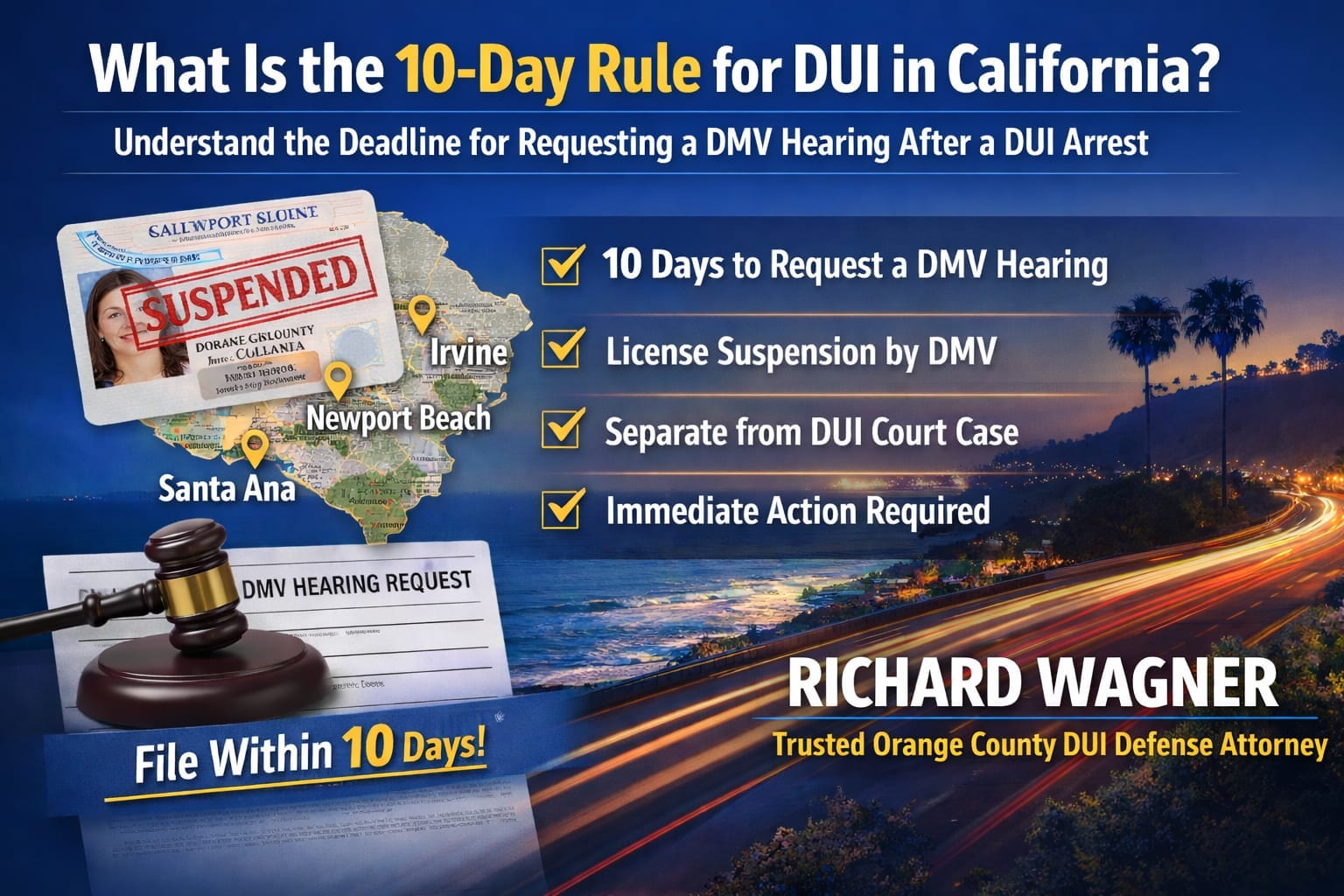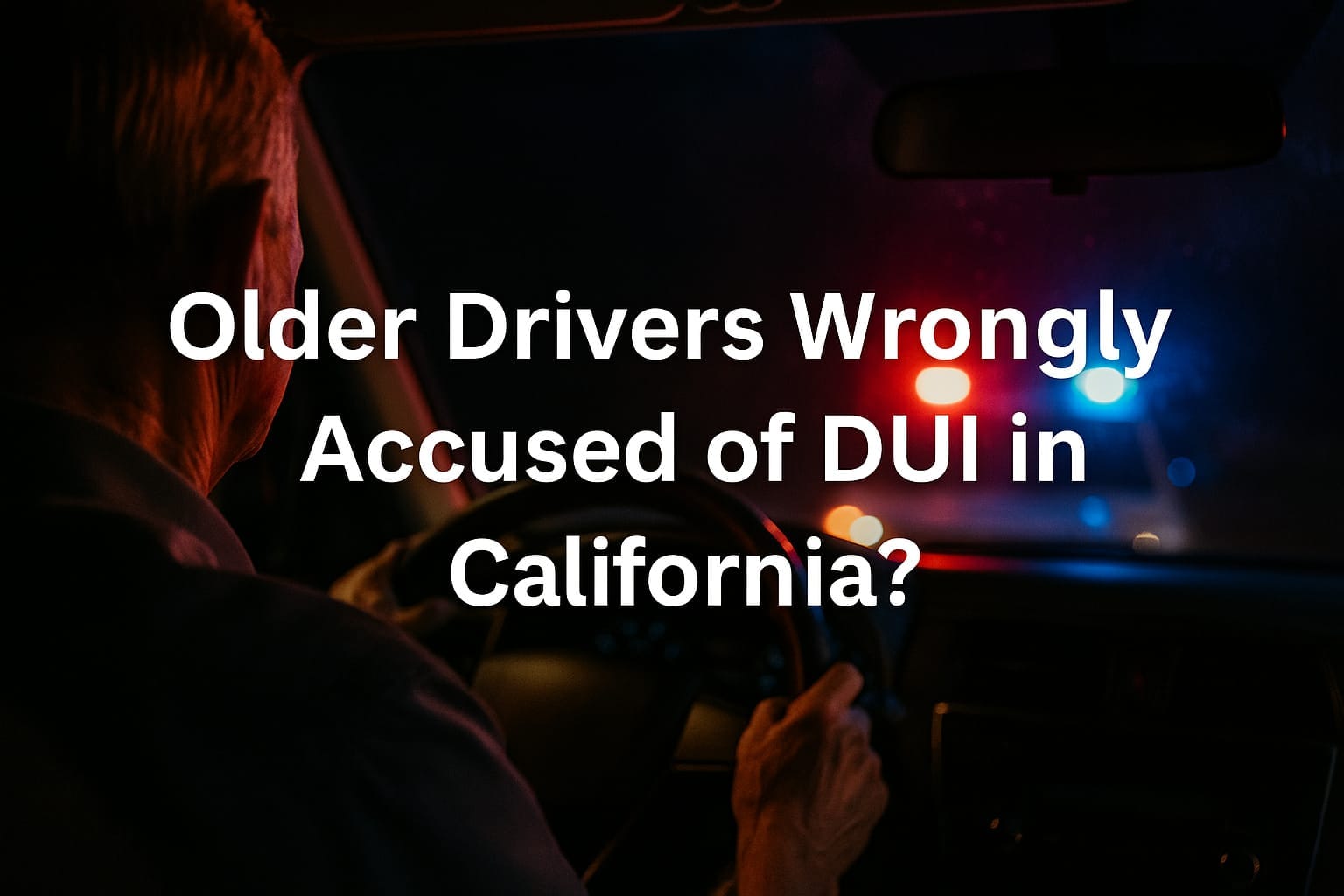You go out for dinner and share a bottle of wine. Or play a round of golf and have a round of drinks while you add up your scores.
Having a party or BBQ … make a beer run … on the drive home, you see a DUI checkpoint.
Should you be worried?
Police in Orange County, Los Angeles, San Bernardino, and Riverside Counties set up checkpoints looking for drunk or drug-impaired drivers.
If the cops have reasonable suspicion that you’re driving under the influence of alcohol or drugs, they will tell you to pull over for questioning. Read About Improper Searches and Seizures
Protect your rights by remaining silent. 5th Amendment, US Constitution. You can also refuse to do the field sobriety tests, and if you are 21 years of age or older and not on DUI probation, you can refuse the Preliminary Alcohol Screening Test (PAS) test. This is the breath test before you get arrested for DUI.
Can You Refuse a DUI Checkpoint?
- If you see a checkpoint up ahead, try to avoid it, if possible. You don’t have to go through a checkpoint if you don’t want to. If it is safe, go down a side road or make a U-turn. However, do not make a U-Turn in a business district, which is illegal.1 Even if you make a legal U-Turn the police may come after you. Some police are under specific orders not to follow drivers for avoiding the checkpoint.2 However, pay attention to your speed and use your signals. Also, before you go out take down anything hanging from your rearview mirror.3 The cops will come after you if violate traffic laws, or if you they think you are driving under the influence. If a cop sees any type of traffic violation she may stop you even if it is a pretext for a DUI investigation.4
- Slow down as you approach the checkpoint. Once you see the checkpoint up ahead if you are not going to avoid it, start to slow down and don’t come to a jerky stop. Focus on your breath. Remain calm. Obviously do not try to speed through the checkpoint. This will cause you all sorts of problems. The police will chase you down, pull you over and you will end up on the news. Some clients have reported that the checkpoint looked like it was a construction zone. They didn’t know it was a checkpoint until it was too late. All they saw were a few orange cones and some construction signs. The law requires the police to use adequate warning signs, adequate lighting, and signals, including substantial police presence. The California Supreme Court calls this the “need to provide an assurance of legitimacy of the search/seizure.”5 The checkpoint must look like an official checkpoint. The cones, flashing lights, and signs should give you enough notice to allow you to avoid the checkpoint.
- If you have not had any alcohol or drugs, the DUI Checkpoint is nothing to worry about. However, in some situations, especially in Orange County, cops will ask you about prescription drugs. It is not a defense if you have a prescription if you are driving under the influence of a drug. Protect yourself and remain silent. If you say you are taking prescription drugs and you are acting nervous, you could be asked to pull over for further questioning. If you tell the police you have been drinking, it doesn’t matter how much you tell them you have had. (Almost everyone says they’ve had 2 drinks). Everyone knows the legal blood alcohol concentration (BAC) in California is .08 percent. That is the law under CVC 23152(b).6 What is not so common knowledge is that you can get a DUI if you are driving under the influence of alcohol under Vehicle Code Section 23152(a).7 This law does not say anything about a BAC. So if you blow into the breathalyzer and it reads below .08 percent or you don’t blow at all, the cops still can arrest you for a DUI under CVC 23152(a).
- Get ready to give your driver’s license and registration to the cop. At this point, the cop is gathering evidence. She is watching how you take your license out of your wallet. Fumbling with your license is a so-called sign of physical impairment. Also, if you can’t find your registration or insurance card (which is quite common), the cop will attribute that to you being mentally impaired by alcohol or drugs. She is also looking to see if your eyes are bloodshot if your speech is slurred and if she can smell alcohol. During this time, the cop is also looking inside your car. If the cop sees contraband in your car, that is probable cause to arrest you.8 It is legal for the officer to use a flashlight to look inside your car.9 And to bend down to get a better view.10 At this point in your encounter with the police, if you have not been arrested and if the police do not suspect you have contraband in your car, the police may not search your car without a warrant or your consent.
- In California, if you are legally arrested you have three choices: (1) breath test, (2) blood test, or (3) refuse. You do not have a right to speak with a lawyer before making this choice.11 If you refuse, in almost every instance the cops will get a search warrant and get a sample of your blood anyway. If it is later proven you refused, you will not be eligible for a restricted license. So even if your BAC is off the charts and you have prior DUIs, you should be able to get a restricted license.
- In those situations where everything goes OK, you should be on your way in no time. How long you were stopped is vital because “the brevity of the invasion of the individual’s Fourth Amendment interests is an important factor in determining whether the seizure is so minimally intrusive as to be justifiable on reasonable suspicion.”12 The law requires the detention to be “minimized.” It should last “only long enough for the officer to question the driver briefly and to look for signs of intoxication.”13 Questioning must “be strictly limited to the purpose of the stop.”14 Do not drive away until the officer says you are allowed to go. Make sure you obey all traffic laws as you steadily pull away.
This is for general purposes only. It is not designed to provide legal advice. If you require legal assistance, please call DUI Attorney Richard Wagner at 714-721-4423 for a Free Consultation.
LEGAL AUTHORITIES
1 California Vehicle Code Section 22102 U-turn in business district, says, “No person in a business district shall make a U-turn, except at an intersection, or on a divided highway where an opening has been provided in accordance with Section 21651. This turning movement shall be made as close as practicable to the extreme left-hand edge of the lanes moving in the driver’s direction of travel immediately prior to the initiation of the turning movement, when more than one lane in the direction of travel is present.”
2 Ingersoll v. Palmer (1987) 43 Cal.3d. 1321, 1336.
3 California Vehicle Code Section 26708 Material obstructing or reducing driver’s view; Exceptions, subdivision(a)(2), says, “A person shall not drive any motor vehicle with any object or material placed, displayed, installed, affixed, or applied in or upon the vehicle that obstructs or reduces the driver’s clear view through the windshield or side windows.”
4 Whren v U.S. (1996) 517 US 806, 809-813.
5 Ingersoll v. Palmer (1987) 43 Cal.3d. 1321, 1333.
6 California Vehicle Code Section 23152 Driving under the influence subdivision (b) says, “It is unlawful for a person who has 0.08 percent or more, by weight, of alcohol in his or her blood to drive a vehicle.”
7 California Vehicle Code Section 23152 Driving under the influence subdivision (a) says, “It is unlawful for a person who is under the influence of any alcoholic beverage to drive a vehicle.”
8 In re James M. (1977) 72 CA3d 133, 137.
9 Texas v Brown (1983) 460 US 730, 739.
10 People v Rogers (1978) 21 C3d 542, 549.
11 California Vehicle Code Section 23612 Testing incident to arrest; Deemed consent; Sanctions for failure to comply; Admissible evidence of test results; Preliminary screening test, subdivision (a)(4) says, “The officer shall also advise the person that he or she does not have the right to have an attorney present before stating whether he or she will submit to a test or tests, before deciding which test or tests to take, or during administration of the test or tests chosen…”
12 U.S. v Place (1983) 462 US 696, 709.
13 Ingersoll v. Palmer (1987) 43 Cal.3d. 1321, 1346.
14 In re James D. (1987) 43 C3d 903, 915.


